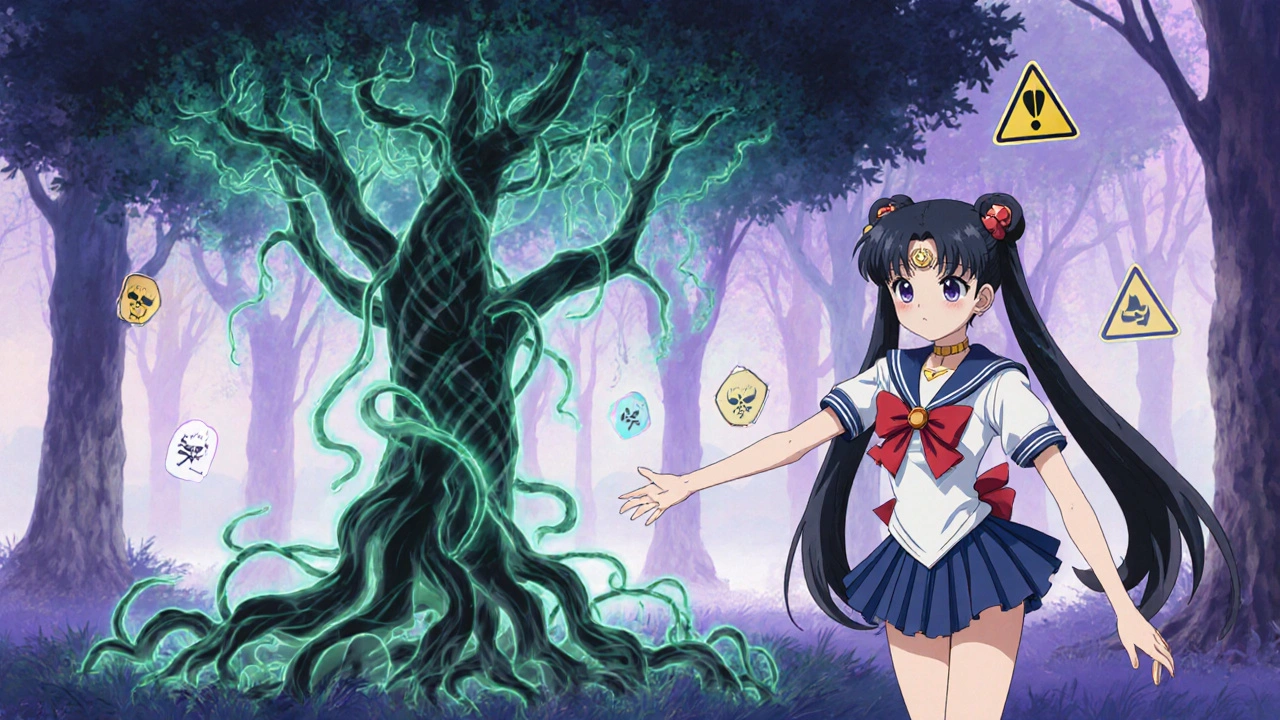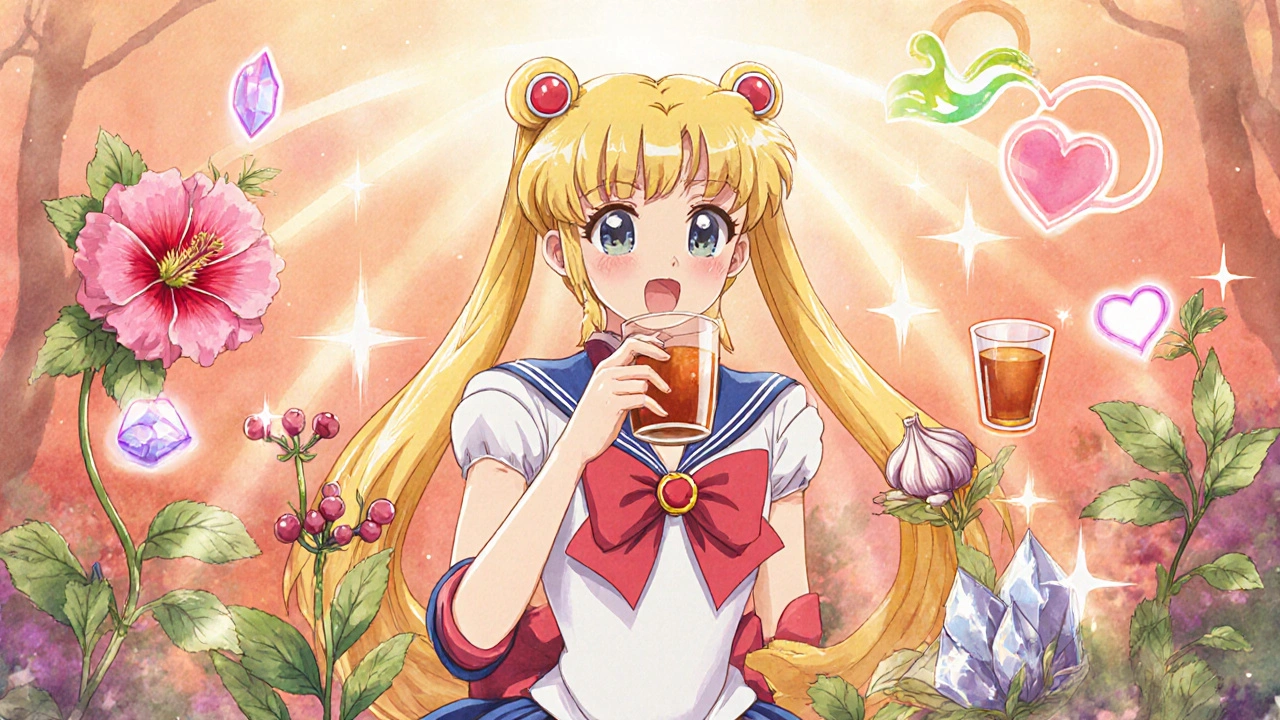Compare Serpina (Sarpagandha) with Alternatives for Blood Pressure Support
 Oct, 28 2025
Oct, 28 2025
Blood Pressure Support Alternative Finder
Personalized Blood Pressure Support Tool
This tool helps you identify the safest and most effective natural alternatives to Serpina based on your individual health profile and medication use.
Recommended Blood Pressure Alternatives
Best Options For You
Why These Work
Key Considerations
Potential Blood Pressure Reduction
High blood pressure doesn’t always need a prescription. For decades, people have turned to Serpina - also known as Sarpagandha or Rauwolfia serpentina - to help manage hypertension naturally. But is it still the best choice today? With so many safer, better-studied alternatives on the market, it’s time to ask: What does Serpina actually do? And are there options that work just as well - without the risks?
What is Serpina (Sarpagandha)?
Serpina is the brand name for a plant extract derived from Rauwolfia serpentina, a woody vine native to India and Southeast Asia. Its roots contain reserpine, one of the first compounds proven to lower blood pressure in clinical trials back in the 1950s. Reserpine works by depleting neurotransmitters like norepinephrine, serotonin, and dopamine from nerve endings. This slows down the nervous system’s drive to constrict blood vessels, which brings down blood pressure.
It’s not a mild herb. In traditional Ayurvedic medicine, it was used sparingly - often as a powder mixed with honey - for conditions like anxiety, insomnia, and hypertension. But modern science has shown that reserpine’s effects are powerful and long-lasting. A single dose can stay active in the body for days. That’s why it was once a mainstream pharmaceutical before newer drugs like beta-blockers and ACE inhibitors replaced it.
Why Serpina Isn’t the Go-To Anymore
Here’s the problem: Serpina’s benefits come with serious side effects. Depression, fatigue, nasal congestion, diarrhea, and even suicidal thoughts have been documented in users. The World Health Organization flagged reserpine as a high-risk agent for psychiatric side effects in the 1980s. Even today, the FDA warns against using unregulated Rauwolfia extracts because dosing is inconsistent and monitoring is nearly impossible.
Unlike prescription medications, herbal supplements like Serpina aren’t standardized. One capsule might contain 0.5 mg of reserpine; another might have 2 mg. That’s a fourfold difference. For someone with high blood pressure, that kind of variability can be dangerous. It’s like driving a car with a brake pedal that sometimes works and sometimes doesn’t.
Also, Serpina interacts with many common drugs - antidepressants, sedatives, even some over-the-counter cold medicines. If you’re on any regular medication, mixing it with Serpina could lead to a sudden drop in blood pressure, dizziness, or worse.
Alternative #1: Hawthorn Berry (Crataegus spp.)
Hawthorn berry has been used in European herbal medicine for over 2,000 years to support heart function. Unlike Serpina, it doesn’t directly deplete neurotransmitters. Instead, it improves blood flow to the heart, relaxes blood vessels, and acts as a mild antioxidant. Multiple clinical trials, including one published in the British Journal of General Practice in 2008, found that hawthorn extract reduced systolic blood pressure by an average of 8-10 mmHg over 10 weeks - similar to low-dose prescription drugs.
It’s gentle. Most people tolerate it well. Side effects are rare and mild - maybe a slight stomach upset. It doesn’t interfere with most medications. You can take it as a tea, tincture, or capsule. Look for standardized extracts with at least 18.75% oligomeric procyanidins. Doses typically range from 160-900 mg daily.
Alternative #2: Garlic (Allium sativum)
Garlic isn’t just for cooking. The compound allicin, released when garlic is crushed, has been shown in over 40 studies to lower blood pressure. A 2016 meta-analysis in the Journal of the American Nutrition Association reviewed 12 randomized trials and found garlic supplements reduced systolic pressure by about 8-10 mmHg and diastolic by 5-7 mmHg.
What makes garlic stand out is how well it fits into daily life. You can eat it raw, take odorless capsules, or use aged garlic extract - which is gentler on the stomach. A typical effective dose is 600-1,200 mg of aged garlic extract daily. It also helps lower cholesterol and reduces arterial stiffness, which are big factors in long-term heart health.
Unlike Serpina, garlic doesn’t cause depression or fatigue. The only downside? Bad breath. But that’s a small price for something that’s been safely used for centuries.

Alternative #3: Magnesium Citrate
Magnesium is a mineral that plays a key role in muscle relaxation - including the smooth muscles lining your arteries. Low magnesium levels are linked to higher blood pressure. In a 2019 review in the Journal of the American Heart Association, researchers found that taking 365-450 mg of magnesium daily for three months lowered systolic pressure by an average of 5.6 mmHg and diastolic by 2.8 mmHg.
Magnesium citrate is one of the most absorbable forms. It’s also gentle on digestion. Many people notice improved sleep and reduced muscle cramps alongside better blood pressure control. Doses of 200-400 mg per day are common. It’s safe for long-term use and works well with other supplements.
It’s not a magic bullet, but it’s one of the most reliable, low-risk options available. And unlike Serpina, you won’t find warnings on the label about suicidal ideation.
Alternative #4: Hibiscus Tea (Hibiscus sabdariffa)
Drink your way to lower blood pressure? Yes, it’s possible. Hibiscus tea - made from the dried calyces of the roselle plant - is packed with anthocyanins and other antioxidants. A 2010 study in the Journal of Nutrition found that drinking three cups of hibiscus tea daily for six weeks lowered systolic pressure by 7.2 mmHg more than a placebo.
It’s easy to use: steep one tea bag or one tablespoon of dried hibiscus in hot water for 10 minutes. Drink it hot or cold. It has a tart, cranberry-like flavor that many enjoy. No capsules needed. No prescription. No risk of depression.
One caution: Hibiscus can interact with hydrochlorothiazide, a common diuretic. If you’re on blood pressure meds, check with your doctor. But for people managing hypertension naturally, it’s one of the most enjoyable and effective options.
Alternative #5: Coenzyme Q10 (CoQ10)
CoQ10 is a compound your body makes naturally to produce energy in cells. As we age, levels drop - and so does heart function. Studies show that supplementing with CoQ10 can improve heart muscle strength and reduce arterial pressure. A 2007 meta-analysis in the Journal of Biomedical Science found that CoQ10 lowered systolic pressure by up to 17 mmHg and diastolic by 10 mmHg in people with hypertension.
It’s especially helpful if you’re taking statins - those drugs deplete CoQ10 in your body. Doses of 100-200 mg daily are standard. CoQ10 is safe, well-tolerated, and doesn’t interfere with most medications. Side effects? Rarely, mild nausea or upset stomach.
It’s not a quick fix. It takes 4-8 weeks to build up in your system. But when it works, it works steadily - without the crash or mental fog that can come with Serpina.
Comparison Table: Serpina vs. Top Alternatives
| Option | Typical Dose | Pressure Reduction (Avg.) | Onset of Action | Side Effects | Drug Interactions |
|---|---|---|---|---|---|
| Serpina (Sarpagandha) | 50-200 mg (unreliable) | 10-20 mmHg | Days to weeks | Depression, fatigue, diarrhea, suicidal thoughts | High - antidepressants, sedatives, cold meds |
| Hawthorn Berry | 160-900 mg | 8-10 mmHg | 4-10 weeks | Mild stomach upset | Low |
| Garlic (aged extract) | 600-1,200 mg | 8-10 mmHg | 2-8 weeks | Bad breath | Low |
| Magnesium Citrate | 200-400 mg | 5-6 mmHg | 4-12 weeks | Loose stools (high doses) | Low |
| Hibiscus Tea | 3 cups daily | 7-8 mmHg | 2-6 weeks | None reported | Medium - with diuretics |
| Coenzyme Q10 | 100-200 mg | 10-17 mmHg | 4-8 weeks | Mild nausea | Low |

Who Should Avoid Serpina Completely?
If you fall into any of these groups, skip Serpina:
- Anyone with a history of depression or anxiety
- People taking SSRIs, SNRIs, or other antidepressants
- Those on sedatives, sleeping pills, or tranquilizers
- Pregnant or breastfeeding women
- Anyone with Parkinson’s disease or other neurological conditions
- People already on prescription blood pressure meds
Even if you think you’re "just trying a natural remedy," Serpina isn’t a safe experiment. The risks aren’t theoretical - they’re documented in medical journals and hospital reports.
What Should You Do Instead?
Start with the safest, most proven options. Try hibiscus tea daily. Add a magnesium supplement. Eat garlic regularly. Consider hawthorn or CoQ10 if you’re looking for more support. Track your blood pressure at home with a validated monitor. Give it 6-8 weeks. If you’re still not seeing results, talk to your doctor about a low-dose prescription - not a risky herb.
There’s no magic bullet. But there are safe, effective, and well-researched ways to bring your blood pressure down without putting your mental health at risk.
Frequently Asked Questions
Is Serpina legal to buy in New Zealand?
Yes, Serpina (Sarpagandha) is available as a herbal supplement in New Zealand, but it’s not regulated as a medicine. That means there’s no guarantee of potency or safety. The Ministry of Health advises caution due to the risk of serious side effects and inconsistent dosing.
Can I take Serpina with my blood pressure medication?
No. Combining Serpina with prescription blood pressure drugs can cause your pressure to drop too low, leading to dizziness, fainting, or even organ damage. Reserpine has a long half-life, so even if you take your medication hours apart, the effects can build up dangerously.
How long does it take for hawthorn or garlic to lower blood pressure?
Most people start seeing small changes in 2-4 weeks, but the full effect usually takes 6-10 weeks. Unlike drugs that work immediately, these herbs support long-term vascular health. Patience is key - and consistent use matters more than high doses.
Is hibiscus tea better than pills for lowering blood pressure?
For many people, yes. Hibiscus tea delivers active compounds in a natural form and is easy to incorporate into daily life. Studies show tea drinkers get the same benefits as those taking capsules. Plus, you’re hydrating while you treat your blood pressure - a double win.
Can magnesium replace my blood pressure pill?
Not on its own - but it can be a powerful addition. Magnesium helps, especially if you’re deficient, but it rarely lowers pressure enough to replace a prescription. Think of it as a supportive tool, not a replacement. Always work with your doctor before stopping any medication.
Why do some people still use Serpina if it’s so risky?
Some people turn to it because they’ve been told it’s "natural" and therefore safe. Others can’t afford prescriptions or don’t have access to healthcare. But "natural" doesn’t mean harmless. Reserpine is a potent drug - whether it comes from a plant or a lab. The risks far outweigh the benefits when safer, equally effective options exist.
Final Thoughts
Serpina might sound like a powerful solution, but it’s a relic from a time when we knew less about how the body works. Today, we have better tools - gentler, safer, and backed by modern science. You don’t need to risk your mental health to protect your heart. Start with hibiscus tea, add magnesium, eat garlic, and consider hawthorn or CoQ10. Track your progress. Talk to your doctor. Your blood pressure doesn’t need a dangerous herb to improve - it just needs consistent, smart care.

Lugene Blair
October 29, 2025 AT 15:14Just switched to hibiscus tea last month and my BP dropped from 152/98 to 128/84. No mood crashes, no brain fog - just chill. Seriously, if you're still using Serpina, you're living in 1965.
Also, garlic + magnesium combo? Game changer. I eat 2 cloves raw every morning. Tastes like a war crime but my arteries thank me.
William Cuthbertson
October 30, 2025 AT 14:16There’s something profoundly ironic about Westerners chasing after ancient Indian herbs like they’re some mystical elixir, then dismissing them as ‘dangerous’ the moment science catches up. Reserpine was the first real antihypertensive - it saved lives before we had ACE inhibitors. The problem isn’t the plant - it’s the commodification of tradition into unregulated capsules sold on Amazon by people who’ve never seen a Rauwolfia vine.
And yet, here we are, calling hibiscus tea ‘natural’ while ignoring that reserpine is *also* natural - just not profitable enough for Big Pharma to patent. We don’t need to demonize Serpina; we need to demand regulated, standardized botanicals - not fearmongering disguised as health advice.
Anna S.
November 1, 2025 AT 03:27Wow. Someone actually wrote a 2000-word essay to justify not taking a dangerous herb? Congrats, you just turned a public health warning into a wellness blog. You didn’t even mention that Serpina is banned in the EU for a reason - it literally causes suicidal ideation. If you’re still using it, you’re not ‘natural,’ you’re just reckless.
Yaseen Muhammad
November 1, 2025 AT 21:22As someone raised in rural Bihar, where Sarpagandha was used by our village Ayurvedic practitioner, I’ve seen both sides. It was never given as a capsule - always a pinch of powdered root mixed with honey, under strict supervision, and only after pulse diagnosis. The danger today isn’t the herb - it’s the lack of context.
Modern users treat it like a vitamin. But in traditional practice, it was a weapon - used sparingly, with fasting, and only for severe hypertension. We lost the wisdom along with the dosage control. The alternatives listed? Excellent. But don’t throw out the baby with the bathwater - just don’t buy it off Amazon.
Dylan Kane
November 3, 2025 AT 12:35Okay but have you guys considered that all these ‘alternatives’ are just placebos with better marketing? CoQ10? Magnesium? Please. I’ve taken all of them. My BP didn’t budge until I started lisinopril. The whole ‘natural remedies’ thing is just capitalism repackaging old myths as ‘wellness.’
Also, hibiscus tea? That’s just fancy cranberry juice with a yoga vibe.
KC Liu
November 4, 2025 AT 23:39Let me guess - this post was sponsored by a CoQ10 company. Who funded this? Is the FDA secretly pushing hibiscus tea now? Why are all these ‘alternatives’ so conveniently available as supplements from the same brand that sells Serpina? This isn’t science - it’s a multi-level marketing funnel disguised as medical advice.
And why no mention of the fact that reserpine is still used in veterinary medicine? Because it works - just not for humans who can afford therapy for their depression.
Shanice Alethia
November 6, 2025 AT 07:40OMG I’M SO GLAD THIS POST EXISTED. I WAS JUST ABOUT TO BUY SERPINA ON AMAZON BECAUSE MY FRIEND SAID IT ‘CURED HER HYPERTENSION.’
LIKE. I JUST GOT OFF ANTI-DEPRESSANTS LAST YEAR. I WASN’T GOING TO RISK MY MENTAL HEALTH FOR A HERB THAT’S BEEN BANNED IN 14 COUNTRIES.
THANK YOU FOR SAVING ME FROM MYSELF. I’M DRINKING HIBISCUS TEA RIGHT NOW AND I FEEL LIKE A NEW PERSON. ALSO I BOUGHT A BLOOD PRESSURE MONITOR. I’M LIVING MY BEST LIFE.
shridhar shanbhag
November 7, 2025 AT 04:13For those who think Serpina is ‘natural’ and therefore safe - please understand: nature doesn’t care if you live or die. Deadly nightshade is natural. Botulinum toxin is natural. Reserpine is a neurotoxin, no matter the source.
But I’m glad people are finally waking up. The alternatives listed here? Perfect. Especially magnesium. I’ve been taking 300 mg daily for 6 months - my cramps are gone, my sleep improved, and my BP dropped 10 points. No drama. No side effects. Just science.
John Dumproff
November 7, 2025 AT 13:46I had a cousin who took Serpina for 3 years. Ended up in a psych ward with severe depression. His doctor said it was the only time he’d seen a herbal supplement cause that level of neurochemical damage.
It breaks my heart that people still think ‘natural’ = safe. I’ve shared this post with my whole family. If you’re reading this and considering Serpina - please, talk to a real doctor. There’s no shame in meds. Shame is risking your mind for a bottle from a website with no reviews.
Eben Neppie
November 9, 2025 AT 02:23Let’s be precise: the WHO’s 1983 classification of reserpine as a high-risk psychiatric agent is not a suggestion - it’s a directive. The FDA’s warning on unregulated Rauwolfia extracts is not a footnote - it’s a red flag.
Hawthorn, garlic, magnesium, hibiscus, and CoQ10 are all backed by peer-reviewed RCTs with low-risk profiles. Serpina has zero standardization, no pharmacovigilance, and a documented history of iatrogenic harm.
Calling this a ‘comparison’ is misleading. There is no fair comparison. One is a pharmaceutical-grade neurotoxin. The others are dietary supports with centuries of safe use. The choice isn’t even close.
Hudson Owen
November 10, 2025 AT 15:00While I appreciate the comprehensive analysis presented, I would respectfully suggest that the tone, though well-intentioned, may inadvertently alienate individuals who rely on traditional medicine systems due to socioeconomic constraints. The assertion that Serpina is ‘dangerous’ is medically accurate, yet the framing may unintentionally stigmatize cultural practices without offering accessible alternatives for those without insurance or healthcare access.
Perhaps a more compassionate approach would acknowledge the historical utility of Rauwolfia serpentina while advocating for policy reform to ensure standardized, affordable botanicals - rather than merely replacing one unregulated product with another set of commercial supplements.
Steven Shu
November 11, 2025 AT 18:03Just want to add - if you’re taking statins, CoQ10 isn’t optional. It’s mandatory. My cardiologist made me start it after I got muscle pain from atorvastatin. Turns out, my BP also dropped 12 points. Coincidence? Maybe. But I’m not stopping.
And yeah, Serpina? No. Just no. I’ve seen too many people try it and crash. Stick with the science. The alternatives work. You don’t need to suffer to get better.